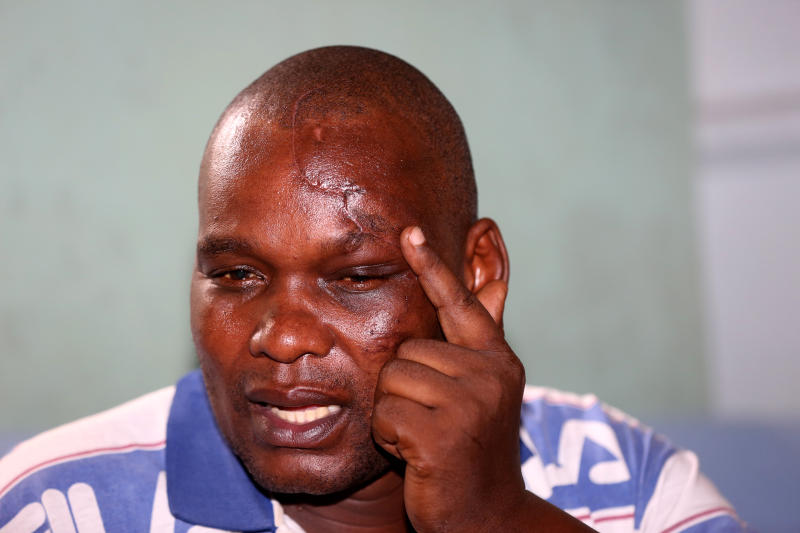Road accidents are giving Kenya are a bad name. Road carnage in Kenya ranks among the 20 in the world according to WHO’s Global Status on Road Safety.
The annual average has been 3000 people dying on Kenyan roads every year. 2017, however, was different.
One particular road, Nakuru-Eldoret highway, has seen a rise in fatalities. More than 150 people have died on the stretch in the month of December alone.
These accidents are often followed by outrage from the public, demanding better services from the government. It has become a vicious cycle now of rage, promises, knee jerk reactions followed by a disturbing lull until the next accident happens.
Yet, there are those, like Thomas Mogiri who bare the permanent scars of road carnage in Kenya.
I meet him at his house in Kaptembwo slum, Nakuru. It is breakfast time. His pain is almost palpable. He has a swollen face and his crutches are next to him just in case he needs to get up.
“It was October 13th, last year. I was going to bury a relative of mine in Keroka, Kisii county” He says.
The journey ended prematurely. Their vehicle was involved in an accident at Sobea along the Nakuru Eldoret highway. He is now nursing multiple injuries.
The father of three escaped death by a whisker in the accident that involved a trailer and a personal vehicle they were travelling in.
Two of Mogiri’s brothers – Ezekiel Matara and Nehemiah Motari died while two others were maimed after they sustained serious injuries during the 5.30am accident.
“My body is itching, I cannot move without these crutches. I miss operating normally.”
In the month of December alone, more than 100 people died along the killer stretch at Teachers are, Sobea, Salgaa, Migaa, Sachangwan and Kamara with several scores injured.
The often forgotted victims of road accidents like Mogiri crawl through life hoping for a quick recovery. He recalls the tribulations caused by the nurses strike. He speaks about it because when he got the accident, nurses were on strike and he had to be rushed to a private facility.
Cost of Medication
During admission, he was forced to sell most of his property and call for more help from friends and family to raise Sh422,000.
Financially, he was strained. Seeing the medical bill rise each day, he requested the hospital management to discharge him, so that he could be nursed at home.
“Every single day, there was the accumulation of money at the hospital, I was disturbed, how was I going to raise that money? I demanded to be discharged, ” narrates the Nakuru county government employee.
Though the management was reluctant to grant him his wish, he was discharged, on condition, he stayed at home for at least seven weeks.
He is still weak. The furthest distance he has travelled ever since the accident is between his bedroom and sitting room.
The accident also affected Mogiri’s sight. He cannot see. He has pain in his eyes and often nurses an acute headache.
” I cannot read, neither operate my phone because my eyes are so painful, ” he says.
He wishes he could get his eyes fixed. He, however, has no money to see an optician. He is giving priority to his other injuries. His weekly medical check-up costs him Sh6,000 per every visit.
Though he is an employee of the county government, he notes that medical cover does not cover the cost of medicine which averages Sh3,500.
“The pain is so deep if I do not take medicine. I need cash to buy the drugs which I do not have,” he states.
He reflects on the accident that has not taken away his freedom, his ability to provide for his family and the indignity that comes with dependency.
“I have developed unknown fear along Nakuru Eldoret highway, the government should set up the dual carriage to avoid premature deaths caused by reckless drivers, ” observes Mogiri.
His elder brother Ezekiel Matara leaving behind a medical bill of Sh4.5million.
“I had hoped that my husband would survive the multiple injuries he had, ” narrates Matara’s wife Lilian Mong’ina.
Mong’ina explains that the family organized a small Harambee to raise the money from friends and well-wishers.
“I am yet to come to terms having lost my best friend, a husband and a loving father to my children. He was the sole breadwinner, I do not know how I will raise my children,” narrates a teary Ms Mong’ina.
As I say goodbye, it dawns on me the complexity and heavy cost paid by victims of road accidents. Often, they are the forgotten victims of the carnage that is attributed to reckless driving, dangerous overtaking, speeding, drink driving among other issues.













